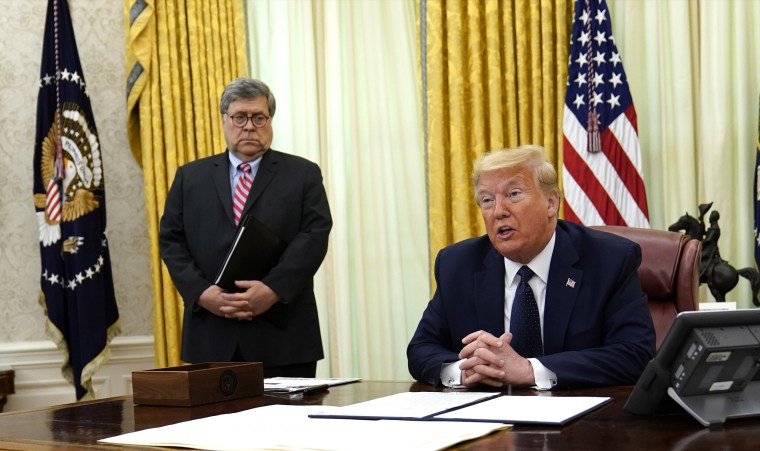Amidst several dozen unhinged tweets this week, Donald Trump turned his attention to a familiar fixation: his desire to see his perceived political enemies prosecuted. After promoting a message demanding the "arrest" of at least one of his rivals, the president asked via Twitter, "Where are all of the arrests?"
Last night, the Republican specifically referenced Barack Obama, Joe Biden, and Hillary Clinton -- every Democratic presidential nominee from the last 12 years -- whom he accused of committing "a criminal act." Trump added, for the second time, that his 2020 rival should not be "allowed" to run against him.
This morning, the president kept the offensive going during an interview with Fox Business' Maria Bartiromo.
"Unless Bill Barr indicts these people for crimes -- the greatest political crime in the history of our country -- then we're going to get little satisfaction.... These people should be indicted. This was the greatest political crime in the history of our country -- and that includes Obama, and it includes Biden."
Trump made no effort to hide his direct lobbying to Attorney General William Barr, repeatedly arguing this morning that the Republican lawyer should indict the White House's foes. "Bill Barr is gonna go down as either greatest attorney general in history of the country, or he's gonna go down as a very sad situation," Trump said.
In the same interview, the president demanded to know, "Why isn't Hillary Clinton being indicted?"
If this rhetoric sounds at all familiar, there's a good reason for that: Trump used eerily similar rhetoric in early September, making up assorted claims of "treason."
Circling back to our earlier coverage, the president's bizarre theories remain delusional. No one spied on his campaign. His perceived enemies did not commit treason. No one in the Obama White House, U.S. intelligence agencies, or federal law enforcement committed "the greatest political crime in the history of our country." These hysterical rants have no basis in reality.
But let's not miss the forest for the trees: the point of these on-air presidential tantrums is to press his attorney general to do his prosecutorial bidding.
In other words, Americans heard a sitting president tell a national broadcast audience -- again -- that his foes are criminals, and he expects the Justice Department to use the levers of power to target his enemies shortly before an election.
I continue to believe that under normal circumstances, this would be a presidency-defining moment. Indeed, if this were happening in another country, the world would look to the United States to condemn the authoritarian antics.
Except, in 2020, the authoritarian antics are coming from our own White House -- with such frequency that it's becoming the annoying background noise of our political lives.
All of which leaves us with an extraordinary closing message from the Republican incumbent: Trump wants Americans to know they should no longer fear a deadly virus, they should no longer expect economic lifelines during a downturn, and they should start expecting the Justice Department to prosecute the president's domestic political foes.
Election Day is 26 days away.

